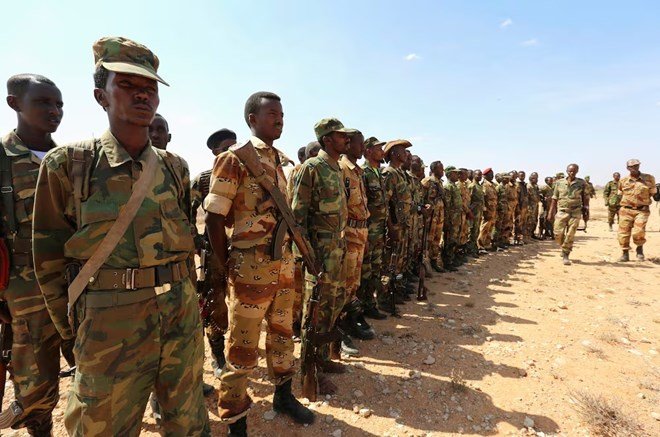Tuesday June 25, 2024 {HMC} Somalia’s UN envoy accused Ethiopian troops on Monday of illegally crossing the countries’ shared border and confronting local security forces.
“Somalia reaffirms its commitment to respecting the principles enshrined in the UN Charter and good neighbourliness,” Abukar Osman told the 15-member Security Council.
“And we expect Ethiopia to do the same by reconsidering its memorandum of misadventure without any further delay.”
advertisements
Because of Ethiopia’s “destabilising actions” in the wider region, Mr Osman said that Mogadishu has had to postpone from July to September the withdrawal of troops with the African Union Transition Mission in Somalia.
Atmis is expected to conclude operations in the country on December 31 after 17 years in the country.
The force was first sent to help drive Al Qaeda-linked Al Shabab out of the Somali capital and to support the internationally recognised federal government.
The AU force is operating under a UN mandate to counter a resurgence of Al Shabab and to train Somali security forces.
Tension is rising between Addis Ababa and Mogadishu, fuelled by an agreement signed in January between Ethiopia and Somaliland, a self-declared republic in northern Somalia.
Ethiopia said it would formally recognise the Republic of Somaliland in exchange for 20km of access to the Red Sea for Ethiopian naval forces, leased for 50 years.
Shortly afterwards, the Arab League convened a ministerial-level emergency session at the request of Somalia, reaffirming that Somaliland is an integral part of the country and categorically rejecting the January agreement.
Somaliland broke away from Somalia in 1991 but remains internationally unrecognised despite its claim to independence. It is in a strategic location close to the Gulf of Aden and the southern mouth of the Red Sea.
The Arab League requested Algeria, as the only Arab member of the UN Security Council, to “mobilise necessary support to issue necessary resolutions affirming the unity, sovereignty and territorial integrity of Somalia”.
The acting special representative of the UN Secretary General, James Swan, expressed concern to the council about the agreement, which he said has “created tensions in the Horn of Africa at a time when the region faces other crises”.
“I recall that the Security Council has repeatedly affirmed respect for the sovereignty, territorial integrity and unity of Somalia,” Mr Swan said.
“I encourage Somalia and Ethiopia to resolve this matter peacefully in accordance with these principles of sovereignty and territorial integrity, as enshrined in the United Nations Charter and international law.”
US deputy ambassador to the UN Robert Wood said Washington remains deeply concerned about political tension between Ethiopia and Somalia, and the negative effect it is having on shared security interests.
“We join the AU and other international partners in reiterating our support for the sovereignty and territorial integrity of Somalia,” Mr Wood said.
“Diplomatic dialogue is the way to de-escalate tensions, and the only way forward.”
On June 6, the UN General Assembly elected Somalia as a non-permanent member of the Security Council for 2025-2026, representing the eastern Africa region.



















